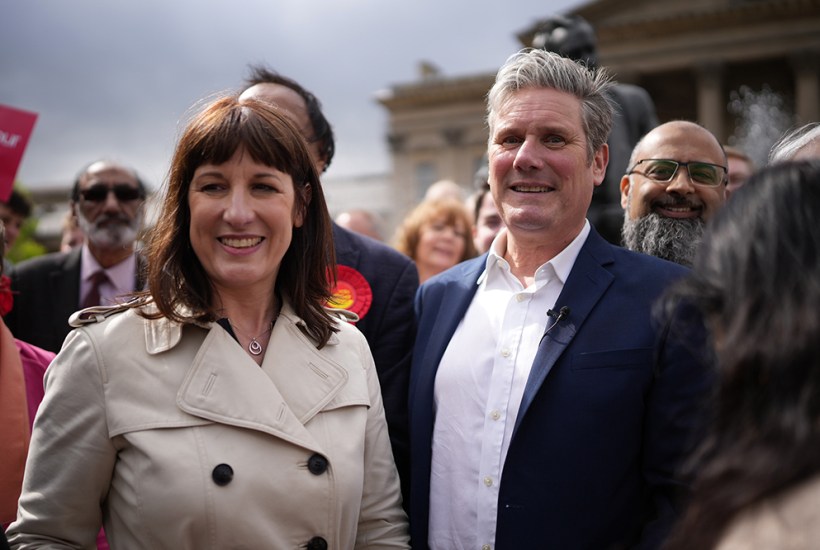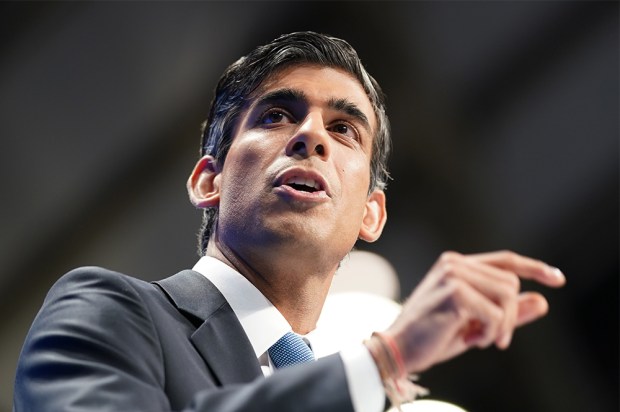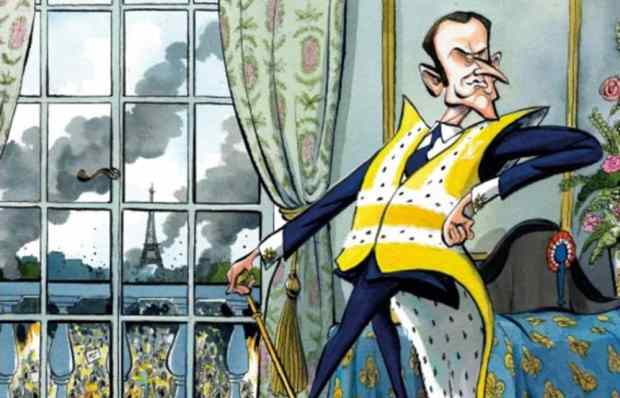It is remarkable that in his conference speech in Liverpool, Sir Keir Starmer hardly mentioned the government’s biggest failures. There is burgeoning public debt, caught in a feedback loop by soaring gilt yields. It didn’t even feature. We have persistent inflation but although Starmer mentioned the ‘cost of living’ crisis several times, he missed out the vital word ‘inflation’. There are ever-increasing levels of illegal migration and a failed pledge to ‘stop the boats’, but again not a squeak from him.
There is a reason why Starmer would avoid mentioning these things, even though the Conservatives’ record provided him with ample ammunition. These are all issues on which, historically, Labour has been weaker than the Tories. Mention deficits and excessive borrowing and it will remind voters – older ones, at least – of Gordon Brown’s eventual loss of fiscal discipline, or of Denis Healey’s trip to the IMF. Likewise, inflation, which topped out at over 25 per cent in Harold Wilson’s government and had to be reined in by Margaret Thatcher’s monetarism. As for migration, anyone exercised by the government’s failure will remember Tony Blair’s mistaken estimates of how many Eastern European migrants would take advantage of the right to work in Britain after ex-Soviet bloc countries joined the EU in 2004.
Starmer has made his party electable again following the Jeremy Corbyn era. The Hamas apologists used to be on stage running the show at Labour party conference: now they are outside, being shouted down by Labour-backing hedge-fund managers. Rishi Sunak’s robust defence of Israel has been matched by the shadow front bench. This is a remarkable achievement, magnified by this week’s events. Starmer deserves full credit.
When a protestor invaded the stage and showered Starmer with glitter, his response further underlined his point that a party which wants reform must first make itself electable. ‘Protest or power,’ he said. ‘That is why we changed our party.’
The polls are very much in Starmer’s favour and bookmakers say his chances of victory are roughly 90 per cent. Yet those who expect a 1997-scale Labour landslide may be disappointed. The circumstances are very different from 26 years ago. Neither inflation nor debt were big issues then and many former Tory voters were prepared to give Blair the benefit of the doubt because they felt financially secure.
To get swing voters to support Starmer will require a bigger leap of faith. They will have to believe that a party that has lost control of the public finances every time it has been in power has now changed its spots. The endorsement for the shadow chancellor Rachel Reeves given by the former Bank of England governor Mark Carney will not go down well with those who believe he shares a good deal of the blame for inflation, by holding interest rates too low for too long and maintaining quantitative easing even when the economy was growing.
Moreover, there will be a vast number of demands on a Starmer government. The unions will expect fat pay rises. Many other groups will expect a public-sector spending spree. Reeves’s declaration that ‘you cannot tax-and-spend your way to economic growth’ and promise of ‘iron-clad’ fiscal discipline is unlikely to withstand reality for long.
Starmer earned a cheer in Liverpool for accusing the PM of ‘scorching the Earth’ by relaxing net-zero targets, yet his own green policy remains one of the biggest threats to financial stability. The policy of decarbonising the national grid by 2030 has been adopted with little idea of how to back up intermittent wind and solar energy. It is a fundamental problem which has not been addressed.
It is hard for any party to remain in power in the UK after 14 years. Sunak is struggling to reset his government. At party conference he showed a willingness to take difficult decisions, calling for reform of net zero and announcing the curtailing of HS2. But other proposals – abolishing A-levels and the lifetime ban on smoking for anyone born in 2009 or later – were baffling. These seem to be personal obsessions rather than a reflection of public priorities.
Of the two parties, Labour had the better conference. Starmer emerged looking more electable than when he went in, having faced down protestors on stage and outside. He kept discipline and his party aligned behind his strategy of being reassuringly dull. Labour has allowed itself only two proper enemies: private schools (a policy aimed at Mr Sunak) and non-doms (aimed at his wife). Starmer seeks to bore the electorate into submission and he may well succeed.
Yet it is hard to detect any real enthusiasm for him. Unlike Blair, who seemed a breath of fresh air after John Major’s squalid administration, Starmer seems wooden and lacking in ambition. His solutions remain unconvincing. There is still a chance that a substantial number of voters will conclude that Sunak represents the lesser risk.
Got something to add? Join the discussion and comment below.
Get 10 issues for just $10
Subscribe to The Spectator Australia today for the next 10 magazine issues, plus full online access, for just $10.
You might disagree with half of it, but you’ll enjoy reading all of it. Try your first month for free, then just $2 a week for the remainder of your first year.














Comments
Don't miss out
Join the conversation with other Spectator Australia readers. Subscribe to leave a comment.
SUBSCRIBEAlready a subscriber? Log in